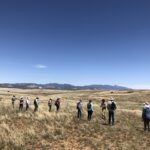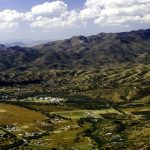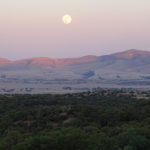
Sep 16, 2015 | Blog
FOR IMMEDIATE RELEASE
Contact: Courtney Sexton, csexton@defenders.org, 202-772-0253
Wendy Russell, wendy@patagoniaalliance.org, 520-477-2308
Federal court flips the off switch on Forest Service’s approval of “Sunnyside” project in Coronado National Forest
Tucson, Ariz. —A district court in Arizona put the brakes on an environmentally destructive exploratory drilling project in the Coronado National Forest near Patagonia, Arizona, saying the Forest Service failed to conduct the appropriate environmental review before fast-tracking the approval of the “Sunnyside” project. In October 2014 conservation groups Defenders of Wildlife and the Patagonia Area Resource Alliance (PARA) filed a lawsuit claiming the Forest Service’s approval violated environmental laws and posed a threat to endangered species in the area.
Statement from Rob Peters, Defenders of Wildlife:

Pictured: Ocelot by Steve Harris
“This is a great victory for the many species of imperiled wildlife that call the Coronado National Forest and the Mountain Empire region home, especially the jaguar, Mexican spotted owl, ocelot and yellow-billed cuckoo, all of which are already at risk from multiple projects in the region.
“The court’s ruling against this destructive mining operation is the best thing that could have happened for the residents of Patagonia and for the incredible and diverse wildlife in the area.”
Statement from Wendy Russell, Patagonia Area Resource Alliance:
“We’re not going to stand by and let the Forest Service rubber-stamp these mining projects in the Patagonia Mountains. There’s too much at stake for both our community and wildlife. This is the second time we’ve had to take them to court, and the second time we’ve won.”
Defenders and PARA were assisted in the case by Roger Flynn, an attorney with the Western Mining Action Project. Flynn noted the importance of local residents’ right to participate in the Forest Service’s review of mineral projects on public land – residents were excluded from this process in the fast-tracking of the approval, a violation of federal law.
Background:
The Canadian mining company Regal Resources’ Sunnyside Project (an exploratory mining operation) involves drilling six exploratory holes for copper deposits up to 6,500 feet deep roughly five miles from the town of Patagonia, Arizona. The Forest Service issued a “categorical exclusion” decision which essentially fast-tracked the mineral drilling exploration and approved the project without involving the public or taking a hard look at the project’s impacts to endangered species. The decision authorized Regal Resources to run its drill rigs for at least five months in sensitive endangered species’ habitat. Loud mineral drilling operations and construction would occur 24 hours a day, seven days a week (using artificial lighting at night) with total project operations and reclamation lasting up to three years.
In January of this year, the Forest Service temporarily withdrew approval for the Sunnyside project until it completed consultation with the U.S. Fish and Wildlife Service to determine whether the project would significantly affect the western yellow-billed cuckoo, which is listed as a federally threatened species. After completing the consultation and concluding that there would be no significant effects, the Forest Service re-issued its approval for drilling to proceed in April, 2015.
###
Defenders of Wildlife is dedicated to the protection of all native animals and plants in their natural communities. With more than 1.2 million members and activists, Defenders of Wildlife is a leading advocate for innovative solutions to safeguard our wildlife heritage for generations to come. For more information, visit www.defenders.org and follow us on Twitter @DefendersNews.
The Patagonia Area Resource Alliance is a citizen watchdog organization that monitors the activities of mining companies, as well as ensures government agencies’ due diligence, to make sure their actions have long-term, sustainable benefits to our public lands, our water, and the town of Patagonia. For more information visit www.patagoniaalliance.org and follow us on Twitter @PARAalliance.
Jun 1, 2012 | Blog
We are thrilled to share this news from the Western Action Mining Project!
“This decision sets a major precedent across the western states,” said Roger Flynn, lead attorney representing the Karuk Tribe of California, and the Director and Managing Attorney of the Western Mining Action Project, a Colorado-based non-profit environmental law firm specializing in mining issues in the West. “The government and miners had argued that the archaic 1872 Mining Law, which is still on the books today, overrides environmental laws such as the Endangered Species Act. The Court flatly rejected that untenable position.” said Flynn.
FOR IMMEDIATE RELEASE
*Federal Ninth Circuit Court of Appeals Rules in Favor of Endangered Species Over 1872 Mining Law* *Strikes Down U.S. Forest Service Approvals of Mining Projects Across West *
June 1, 2012
Contacts: Craig Tucker: Karuk Tribe of California, Klamath River Coordinator, Happy Camp, California. 916-207-8294
Roger Flynn: Attorney, Western Mining Action Project, Lyons, Colorado (303) 823-5738
Happy Camp, California, and San Francisco: In a highly-anticipated decision from the En Banc panel of 11 judges of the federal Ninth Circuit Court of Appeals in San Francisco, the Court today held that the U.S. Forest Service violated the federal Endangered Species Act (ESA) when the agency approved a slew of mining operations in salmon habitat in and along the Klamath River system in northern California. The new decision, issued by a majority of seven judges on the En Banc panel, reversed a lower court decision (issued in 2005) and a previous decision of a 3-judge panel of the Ninth Circuit (issued in 2011). The earlier decisions had affirmed the federal government’s actions in approving numerous “suction dredge” and other mining operations, such as “highbanking” and “motorized sluicing,” in designated “critical habitat” for the Coho Salmon, listed as a threatened species in Southern Oregon and Northern California under the ESA. The case was brought by the Karuk Tribe of California, which initially filed the lawsuit in 2004 in federal court in Oakland.
The Tribe filed the lawsuit to protect the salmon and its habitat, which have been a central part of the Tribe’s existence since time immemorial. Beginning in the early 1990s, a flood of smaller-scale mining operations, primarily suction dredging operators, invaded the Klamath River system to search for gold in and along the banks of these rivers and streams. As described by the Court’s decision, “These miners use gasoline- powered engines to suck streambed material up through flexible intake hoses that are typically four or five inches in diameter. The streambed material is deposited in a tailings pile in or beside the stream. Dredging depths are usually about five feet, but can be as great as twelve feet.” The Court detailed the scientific studies that found that suction dredging in critical species habitat “can directly kill and indirectly increase mortality of fish — particularly … salmonid eggs and early developmental stages.” “Highbanking” and “motorized sluicing” occur mainly outside the river, where mining operators pump water out of the stream to strip the riverbank of materials for processing in sluice boxes, then dump the remaining materials in tailings waste piles along the shore.
Beginning in 2003 and 2004, the Forest Service allowed suction dredging and highbanking/sluicing on more than 35 miles of the Klamath River and its tributaries, without conducting any public environmental reviews, without subjecting its actions to any public notice, and, importantly for this case, without any compliance with the ESA. The Tribe’s lawsuit challenged the agency’s failure to protect the salmon and its habitat, which have been determined by the National Oceanic and Atmospheric Administration (NOAA) to be threatened with extinction. The agency had approved all of the mining via its “Notice of Intent” (NOI) process, which the agency argued exempted itself from compliance with federal environmental and wildlife protection laws.
The Court rejected that claim, concluding that: “We therefore hold that the Forest Service violated the ESA by not consulting with the appropriate wildlife agencies before approving NOIs to conduct mining activities in coho salmon critical habitat within the Klamath National Forest.”
“Today, the Court vindicated our long struggle to protect the salmon and our people, which have been linked together since time immemorial,” said Leaf Hillman, Director of the Karuk Tribe’s Natural Resource Department. “The Forest Service’s decision to place the search for miniscule flakes of gold above the needs of people who rely on clean water, and especially wild salmon, was unconscionable,” continued Hillman. “We had no choice but to challenge the agency’s illegal mining approvals,” said Hillman.
“This decision sets a major precedent across the western states,” said Roger Flynn, lead attorney representing the Tribe, and the Director and Managing Attorney of the Western Mining Action Project, a Colorado-based non-profit environmental law firm specializing in mining issues in the West. “The government and miners had argued that the archaic 1872 Mining Law, which is still on the books today, overrides environmental laws such as the Endangered Species Act. The Court flatly rejected that untenable position.” said Flynn.
Although focused on the mining in northern California, the Forest Service’s practice of failing to consider the ESA when approving smaller-scale mining projects such as suction dredging occurs throughout the West. “Today’s decision sets the proper balance between mining and the protection of clean water and wildlife habitat across the West,” noted Flynn. “The law requires that the federal agencies ensure that mining is responsible and reasonable, and protects communities and the environment. The Court today re-affirmed this guiding principle of federal public land management.” said Flynn.
“To the Karuk people, salmon and free-flowing clean water are essential elements of our culture and heritage,” said Hillman. “With today’s decision, we can begin to repair the damage caused by irresponsible mining and look forward to a brighter future for the salmon and our people.” concluded Hillman.
A copy of today’s decision can be found on the Court’s website at:
http://www.ca9.uscourts.gov/datastore/opinions/2012/06/01/05-16801.pdf











